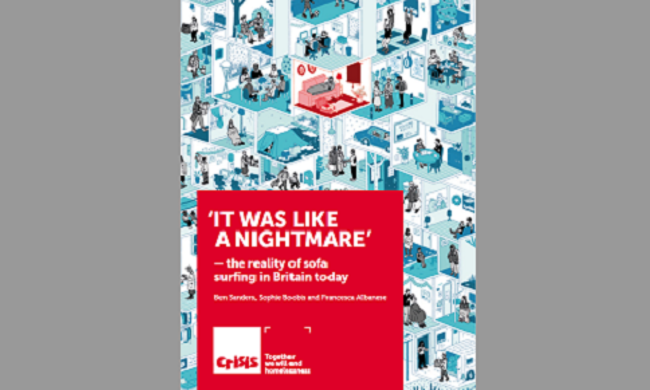It was like a nightmare – the reality of sofa surfing in Britain today
23.12.2019
Based on face-to-face interviews with 114 people with current or recent experience of sofa surfing across 12 locations, the report shines a light on the most common form of homelessness yet which is the least visible and understood. The research was conducted independently by Crisis and has been made possible with support from players of People's Postcode Lottery.
Key findings
- There are 71,400 homeless families and individuals forced to sofa surf across Great Britain on any given night
- Yet the term sofa surfing does little to capture the complex realities and frequent transitions that are the reality of it. Nor does the term provide any insight into the damaging consequences it produces.
- This research shows how a ‘permanent impermanence’ characterised the lives of the research participants: in the preceding 12 months six out of 10 had moved up to four times, while two-fifths had done so more than five times. Episodes of sofa surfing can last a few days but for one in four it meant being stuck for between three and six months.
- People are also much less likely to come from secure housing situations into sofa surfing. Unlike previous research, this study highlights that people are more likely to come from other insecure housing situations i.e. rough sleeping. Housing situations after sofa surfing tend to replicate those preceding it.
- The causes and drivers of sofa surfing mirror those of homelessness in general with over half (54%/61) of those in the study stating that issues related to housing affordability were a factor in starting to sofa surf. Welfare reform was also a driver with over a third (38%/26) citing the gap between Local Housing Allowance rates and Housing Benefits and rents as leading them to sofa surf.
- Sofa surfing is detrimental to mental and physical health with the majority of participants reporting both getting worse. Personal relationships also suffer. Over half (58%/66) saw friends and family less and relationships with hosts could worsen over time.
- Sleeping on a sofa or a floor means poor and uncomfortable sleep; not having private space nor the ability to have a personal routine. It can also mean being exposed to other people’s anti-social behaviour, which can undermine attempts to address support needs, and six out of 10 (61%/70) were locked out of the premises during the day.
- All these experiences can make it harder to seek support and can compromise attempts to find a job or maintain one.
- The majority of participants (93%/106) sofa surfing had approached a local authority for housing support yet in fewer than half of cases (46%/52), where people had engaged with the council prior to sofa surfing, was their new housing status recognised. In many cases their homelessness could have been prevented.
- Participants’ considered better access to affordable housing and help with addressing supports needs as the best ways to have prevented them sofa surfing in the first place.
Reference
Sanders, B., Boobis, S., and Albanese, F. (2019) ‘It was like a nightmare’ The reality of sofa surfing in Britain today. London: Crisis
Downloads

It was like a nightmare - the reality of sofa surfing in Britain today 2019
Based on face-to-face interviews with 114 people with current or recent experience of sofa surfing across 12 locations, the report shines a light on the most common form of homelessness yet which is the least visible and understood. The research was conducted independently by Crisis and has been made possible with support from players of People's Postcode Lottery.
